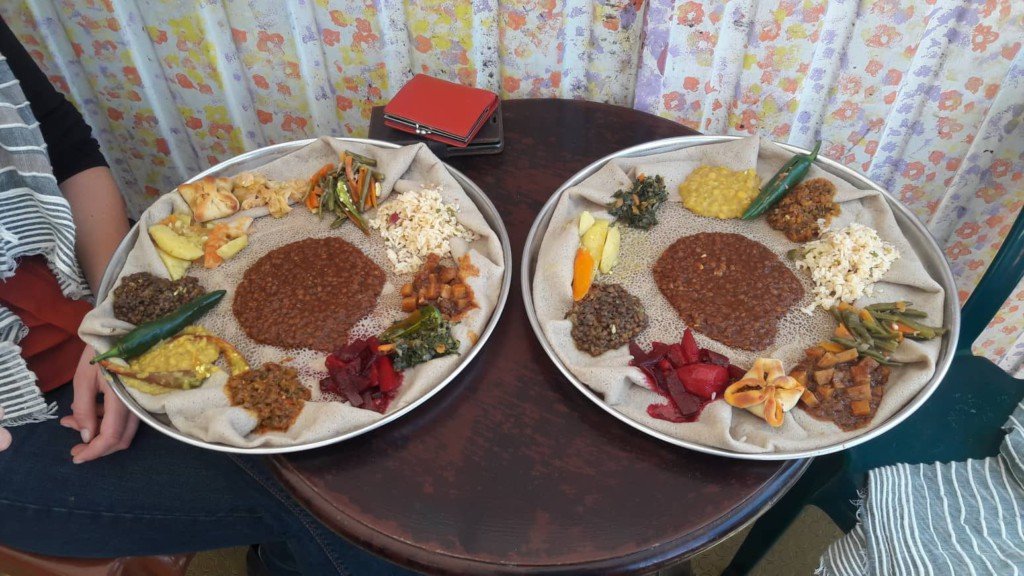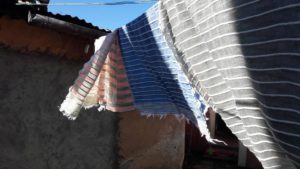English Version below.
So, passend zum Abschluss meines ersten Monats in Äthiopien schreibe ich meine letzten ersten Eindrücke nieder. Das Thema: besondere Ereignisse – dieser Beitrag besteht aus einem Durcheinander verschiedener Erlebnisfetzen, die ich unter diesem Motto zusammentragen kann.
Grüße aus dem Jenseits
In meiner ersten Woche in Addis Abeba kam eine Mitarbeiterin der Deutschen Botschaft an das Goethe-Institut, um einige Projekte mit meiner Chefin zu besprechen. Ich durfte zuhören und wurde zu Injera und Kaffee eingeladen. Da unser Gast wusste, dass ich grade erst in Addis angekommen war, brachte sie mir eine deutsche Broschüre über Addis Abeba mit. Sie sei zwar etwas älter, aber relativ aktuell und gut zu lesen. Ich schlage also das Heft auf und lese den erstbesten Artikel, ein Erfahrungsbericht über die Reise nach Äthiopien und persönliche Eindrücke von Addis. Interessant…Ich lese den Namen des Verfassers…Dr. Dietmar Herz. – Dr. Dietmar Herz, einer meiner Lieblingsprofessoren an der Universität Erfurt, der leider vor kurzem verstarb. Ein Mensch, der mich in zwei Seminaren, die ich bei ihm besuchte, viel gelehrt hat. Unter anderem brachte er mich dazu die Werke von Lion Feuchtwanger zu lesen, dessen Wartesaal-Trilogie jetzt zu meinen absoluten Lieblingswerken gehört. Es kam mir vor, als würde mir Herr Dr. Herz aus dem Jenseits zunicken. Es war wirklich eine Überraschung!
Du gehörst der Welt
In meinem letzten Beitrag habe ich vor allem von Hürden gesprochen und über Dinge berichtet, die mir schwer fallen. Auch wenn ich weiß, dass ich geduldig mit mir sein muss und es auch in Ordnung ist, wenn man eben nicht der Mensch ist der sofort super zurechtkommt, fühle ich mich, wenn ich meine Ängste/Sorgen laut ausspreche, meist etwas kleinbürgerlich. Schreckhaft, geradezu spießig und überhaupt nicht frei, jung, selbstständig, abenteuerlustig und so weiter. Umso schöner kam mir ein Gespräch in einem der Minibusse vor. Ein älterer Mann sprach mich darauf an, wie lange ich bereits in Äthiopien sei, wo ich herkomme und was ich vorher gemacht hätte. Ich erzählte von Berlin, Erfurt, Weimar und erwähnte auch Australien – er lächelte mich an und sagte: Obviously, you belong to the world. Ich fand das so nett – nur ein kurzer Satz, aber ich fühlte mich nicht mehr ganz so klein.
Demos, Warnungen und Vorsichtsmaßnahmen
Meine Ankunft in Addis Abeba fiel in eine außergewöhnliche Zeit. Wie schon einmal erwähnt, besitzt Äthiopien einen sehr reformbereiten Premierminister, Abiy Ahmed. Dieser hatte vor kurzem eine ehemals verbotene Partei eingeladen, wieder am politischen Leben teilzunehmen. Nicht alle waren von dieser Maßnahme begeistert. Auf diesem, zum Teil ethnisch motivierten, Konflikt gründeten sich einige Ausschreitungen, die das Stadtleben deutlich einschränkten. Mehr dazu hier:
https://www.thereporterethiopia.com/article/addis-edge
https://www.thereporterethiopia.com/article/five-die-bombs-apprehended-addis-ababas-demonstration
Für das Goethe-Institut Addis Abeba war es schwierig die Lage einzuschätzen, da es kaum zuverlässige Informationen über die Situation gab. Das mobile Datennetz war rund 2 Tage ausgeschaltet, vermutlich um Massenverabredungen zu Demos zu verhindern. Mich persönlich regte das unglaublich auf – ich besitze zuhause kein Wlan und musste mein Whatsappcalldate mit meinem Freund verschieben. In einem fremden Land, in einer solch ungewöhnlichen Situation nicht nach Hause telefonieren zu können war schon ziemlich stressig. Auch die Arbeit am Goethe-Institut wurde durch die Situation massiv eingeschränkt. Zum Beispiel wurden wir an einem Tag Mittags alle nach Hause geschickt wurde – aus Sicherheitsgründen, denn es hieß später würde man kein Taxi mehr bekommen. An einem anderen Tag ging ich nichts ahnend zum Goethe-Institut – auf dem Weg fiel mir plötzlich auf, dass nur wenige Menschen meinen Weg kreuzten. Wie schön, dachte ich mir noch, endlich mal Ruhe. Dann sah ich es. Kurz hinter dem Goethe-Institut fand eine Demonstration statt. Das war also der Grund warum die Gegend wie ausgestorben war, denn es kursierte die Warnung jede Form von Menschenmassen zu meiden! Schnell bog ich zum Goethe-Institut ab, wo ich erfuhr, dass es sich um eine friedliche Demo handelte, die sich gegen die Gewalt der letzten Tage aussprach. Mehr dazu hier:
https://www.thereporterethiopia.com/article/addis-ababa-demonstrates-against-recent-violence
An einem anderen Morgen rief mich meine Chefin an, ich solle aufgrund von Sicherheitswarnungen besser nicht zum Goethe-Institut kommen. Nachdem ich mir also einen schönen faulen Vormittag auf der Couch gegönnt hatte kam die Durchsage, dass es falscher Alarm gewesen sei. Es war also ein Hin und Her und keiner schien einen richtigen Überblick über die Situation zu haben, nach einem weiteren Wochenende schien sich immerhin das soziale Stadtklima etwas beruhigt zu haben. Jedenfalls kamen mir die meisten Menschen entspannter vor, der Verkehr wirkte relativ normal und das mobile Datennetz ging wieder einwandfrei. Seitdem kam es in einem solchen Maß nicht mehr zu Aufruhr. Trotzdem schweben noch einige Konflikte im Raum, aus Sicherheitsgründen wurde letztens eine Hauptstraße für ein paar Stunden gesperrt und der Semesteranfang wird aus Vorsicht vor möglichen Konflikten zwischen verschiedener Studentengruppen immer weiter nach hinten verschoben. Die Menschen, die ich hier kennengelernt habe, reagieren sensibel auf diese Vorkommnisse und machen sich durchaus Sorgen. Für mich, als Neuankömmling, ist es schwierig überhaupt etwas zu diesen komplexen Sachverhalten etwas zu sagen, geschweige denn eine Meinung zu entwickeln.
German Church School
Ein weiteres Erlebnis der besonderen Art war der Besuch bei der Schuljahresanfangs-assembly der German Church School, die nicht weit entfernt von meiner Arbeit in der Nähe des Arat Kilo liegt. Meine Chefin und ich gingen hin, um die Unterstützung des Goethe-Instituts zu signalisieren. Das war deshalb nötig, weil die Schule sich ausschließlich durch Spenden finanziert und momentan strauchelt, sich weiter halten zu können. Ich kann nur alle Daumen drücken, dass die Schule in Zukunft wieder mehr finanzielle Unterstützung erhält, denn sie scheint für die Schüler viel zu leisten: Sie nimmt vor allem Kinder aus ärmeren Haushalten in der nahen Umgebung auf. Kinder, deren Familien die Schulgebühren nicht zahlen könnten, erhalten eine gute Bildung von der ersten Klasse bis zum Abitur. Mehr dazu hier:
http://schule.addis.center/joomla/
Die Schule besitzt in, aber auch außerhalb Addis Abebas einen guten Ruf, wegen des besonderen Fokus auf Inklusion. Was das in der Realität bedeutet wurde uns während der Assembly gezeigt: Ich war wirklich zu Tränen gerührt. Kinder mit Gehbehinderungen oder auch blinde Kinder führten zusammen mit den anderen Schülern Karateübungen auf. Sie schienen es wirklich zu genießen einfach Teil des normalen Schullebens zu sein. Jedes Kind mit Einschränkungen besitzt wohl zwei andere Kinder als Paten, die dieses durch den Schulalltag geleiten und bei Schwierigkeiten helfen. Als christliche Schule werden außerdem auch Kinder mit muslimischen Glauben ohne Vorbehalt aufgenommen. Ein echtes Beispiel für gelungene Integration!
Letzte erste Eindrücke
Ich könnte noch so viele weitere kleine Schnispel einfügen. Ich könnte ausführlich vom Meskelfest erzählen, dem Essen, einer Party, dem Stoffmarkt, dem Enter Africa Workshop am Goethe-Institut, einem tollen Konzert, einer Musikbar und und und… Jetzt ist allerdings erstmal genung – bis Bald!
P.S. Entschuldigt das späte hochladen dieses Artikels, es kam einiges Unvorhergesehenes dazwischen. Ich update euch sobald wie möglich!
English Version
Now, at the end of my first month in Ethiopia, I am finally writing down my last ‘first impressions’. The topic: experiences/events out of the norm – this article consists of a whirl of short memories which I collected under this motto.
A salute from the afterworld
In my first week in Addis Ababa, someone from the German Embassy visited us at the Goethe-Institut, in order to talk with our director about multiple projects. I was allowed to listen and got invited to injera and coffee. Our guest knew that I just arrived in Addis, so she gave me a brochure about the country/the city with the words that it had been published a while ago, however, it would still be an interesting read. So, I am opening the booklet and start to read the first article – a description of someone’s journey to Ethiopia. I look at the name of author… Dr. Dietmar Herz. – Dr. Dietmar Herz, I cannot believe it. One of my favorite lecturers at Universität Erfurt who sadly passed away in the last year. A person who taught me a lot in just two seminars and who made me read Lion Feuchtwanger for the first time – who’s ‘Wartesaal-Trilogie now belongs to my favorite works ever. It felt like Herr Herz nodded to me from the afterworld. It was truly a surprise!
You belong to the world
In my last article I mainly wrote about challenges for me in this city. Even though I know I must be patient with myself and that it is okay to not be the most confident-easily adapting person, I feel pretty petty talking about my difficulties. Skittish and formerly overprotected – not at all like the things that I want to identify with like free, young, independent or adventurous . This is why a certain conversations in one of the minibuses really made my day. An elderly man asked me where I was from and how long I have stayed in Ethiopia and what I had done before. I told him my stays in Berlin, Erfurt, Weimar and Melbourne – he smiled and said: Obviously, you belong to the world. I found his words so kind in that moment – I did not feel as small and petty anymore
Demonstrations, warnings and precautionary measures
My arrival in Ethiopia fell into a very extraordinary time. As already mentioned in another article, in Ethiopia a very ‘reform-ready’ prime minister, Abiy Ahmed, is in office. Just currently he re-invited a former forbidden party to take part in politics again, in a peaceful way. Not everyone was happy about this measure. Because of this, partly ethnically motivated, conflict – demonstrations were held and riots appeared which restricted normal city-life significantly. More information you can find here:
https://www.thereporterethiopia.com/article/addis-edge
https://www.thereporterethiopia.com/article/five-die-bombs-apprehended-addis-ababas-demonstration
For the Goethe-Institut Addis Abeba, it was difficult to judge the situation objectively, as we had no access to reliable information. The mobile networks were switched off for around two days, probably in order to hinder people from organizing themselves in a violent way. Personally I found this most annoying – in my accommodation I do not have Wifi and had to just drop my Whatsappcalldate with my boyfriend. To be in such an uncommon situation in a country that is foreign to me, without being able to call home, was pretty stressful. Also working at Goethe was possible only in restricted ways. For example, one day around lunchtime, everybody was sent home due to warnings that leaving the house would not be safe later in the afternoon and taxis would not drive anywhere. Another day I was on my way to Goethe-Institut in the morning when I suddenly realized that there are barely any people on the street. Awesome, I thought, finally it is not so crowded! Then I saw why: Just in front of me, maybe a hundred meters in front of me there was a great demonstration taking place – it seemed like a wall of people in front of me. This is why no one was walking next to me, as everyone was warned to avoid crowds to escape violence. Luckily, I was just in front of Goethe-Institut and quickly managed my way into the building. There I found out, that this one demonstration actually had a peaceful mission, because people were protesting against the riots within the last days. More information you can find here:
https://www.thereporterethiopia.com/article/addis-ababa-demonstrates-against-recent-violence
Another morning my boss called me and advised me to not come to work because of safety issues. After staying on my couch the entire morning and being really lazy, I was told that it was false alarm and I actually could have gone to work. Oh well… Anyway, those few days were obviously really confused and no one seemed to have an overview. After the weekend, however, the situation had calmed down. People on the street seemed more relaxed, traffic was back to usual, the mobile networks were working again. Since then, there has been no other situation which impacted city-life in such an intense way – nevertheless, not all conflicts have been solved. One of the main streets of the city was blocked the other day for safety-issues, the beginning of the semester has been postponed multiple times, apparently because of fear of conflict between students with different backgrounds. The people I got to know here do react very sensitive to those developments – they seem worried for the peace in their country. For me, as a new person in Addis, it is difficult to say something about the events at all, because of the complexity of the circumstances/ political history.
German Church School
A really special experience was visiting the school-assembly, announcing the beginning of the school year, of the German Church School. The school does not lie far off from my work, next to the place called Arat Kilo. My boss and I went there in order to show the support of the Goethe-Institut. This was needed, as the school is financed through donations only and currently fears to not be able to stay open in future. I hope that the school receive more donations in future, because it seems to offer a lot for its pupils: It opens its doors for children from poorer homes in the neighbourhood who do not have to pay but will receive quality education from the first grade until their university-entrance diploma. More information you can find here:
http://schule.addis.center/joomla/
The school is known for its quality in, but also outside from Addis – also because of its great focus on inclusion. We could see a glimpse of this in reality, as during the assembly children with limited mobility or who are visually handicapped performed karate tasks, together with the other kids. Thry seemed to enjoy it so much, I was brought to tears. Apparently every handicapped child is led by two other kids to the every-day-routines at school – every single day. On top of that, as a Christian school they also accept Muslim-children without reservation. A real example for sufficient integration!
Last first impressions
I would be able to put so much more into this article and write about the Meskel celebrations, the food, a party, the markets, an awesome workshop for the ‘Enter Africa’-workshop at Goethe-Institut, a grat concert, a music bar and and and… However, this shall be it for now. You hear from me soon.
P.S. Sorry for posting this article so late, there have been a few unexpected events. I will update you as soon as possible!
![By United States Central Intelligence Agency [Public domain], via Wikimedia Commons By United States Central Intelligence Agency [Public domain], via Wikimedia Commons](https://kulturweit.blog/jnninaddisabeba/files/2018/08/Et-map-300x321.png)


